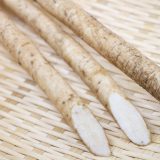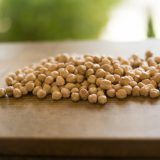
Eating more fiber will quadruple the amount of poop! ??
 This time, I will introduce the relationship between dietary fiber and the amount of defecation.
This time, I will introduce the relationship between dietary fiber and the amount of defecation.
We will also tell you why dietary fiber increases the amount of poop, and the dietary fiber and illnesses that can be considered from it, so please read it to the end.
Eating fiber quadruples the amount of poop! ??

There is a research report on "Relationship between dietary fiber and cancer" by Dr. Dennis Berkit, a British doctor in 1972.
According to the study Africans who have plenty of dietary fiber of 60-80g a day are compared to the average British. 4 times or more I put out poop every day I found out.
In Japan, it is said that the amount of dietary fiber that should be ingested per day is 20g, so 60-80g is an amazing amount.
African farmers averaged 470g of bowel movements, while British students averaged 104g of bowel movements, more than four times different.
Furthermore, looking at the gastrointestinal transit time, African farmers average 36 hours. Whereas it was a British student Averages 73 hours It turned out to be.
This gastrointestinal transit time is both from eating to passing through the stomach and the small intestine. almost the same So, it was the time I was staying in the large intestine that opened wide.
| Defecation volume | Time to defecation | |
|---|---|---|
| African farmers | Average 470g / day | 36 hours on average |
| British student | Average 104g / day | 73 hours on average |
Why does eating a lot of dietary fiber increase "defecation volume" and shorten "time to defecation"?

According to Dr. Berkit's research results, eating a lot of dietary fiber increases the amount of defecation and shortens the time to defecation.
Next, "Why does eating a lot of dietary fiber increase the amount of defecation and shorten the time to defecation?" I will tell you about.
"Defecation volume" increases because dietary fiber is entwined with water and food waste.
The increase in defecation volume is due to Among dietary fibers, insoluble dietary fiber is especially entangled with water, food waste, and harmful substances. is.
Dietary fiber includes water-soluble dietary fiber and insoluble dietary fiber.
Foods that contain fiber contain both, but they have different characteristics.
Water-soluble dietary fiber softens poop.
Insoluble dietary fiber, on the other hand, increases the amount of poop and excretes harmful substances out of the body along with the poop.
in short, It is the power of this insoluble dietary fiber that increases the amount of defecation It is.
If you would like to know more about water-soluble dietary fiber and insoluble dietary fiber, please see here.

What is water-soluble dietary fiber? Explain the function and type, the foods that are abundant and how to take it correctly!
What is insoluble dietary fiber? Explain the work and types, the foods that are abundant and how to eat well!
The reason why the "time to defecation" is shortened is that dietary fiber acts as a leader and activates intestinal activity.
This also shortens the defecation time Because insoluble fiber activates intestinal activity and encourages pooping is.
Insoluble dietary fiber has the function of activating the peristaltic movement that promotes poop.
As a result, food brought in from the small intestine becomes poop without staying in the large intestine for a long time and is excreted from the body.
Explaining the difference in defecation time between Africans and British people earlier, Africans were steadily excreting poop out of the body without accumulating it in the large intestine because they consumed an amazing 60-80 g of insoluble dietary fiber. So the time was shortened.
Intestinal fermentation occurs when you eat a lot of dietary fiber, which leads to prevention of illness!

Next, I will tell you why taking dietary fiber helps prevent illness.
In the above story, I talked about the fact that taking dietary fiber increases the amount of defecation and shortens the time to defecation.
However, I don't know what to do with this, which means more flights and shorter times, so I'll talk about why.
By ingesting dietary fiber Intestinal putrefaction Can be prevented.
Intestinal putrefaction is the growth of bad bacteria in the intestines and the generation of harmful substances when the poop is not excreted from the body and stays there.
Dietary fiber intake (1) It shortens the time that the poop stays, and (2) it absorbs the harmful substances that are born and discharges them to the outside of the body, preventing intestinal putrefaction. ..
Dietary fiber discharges poop steadily to prevent constipation, and it also reduces the risk of lifestyle-related diseases and cancer because it causes the generation of harmful substances and discharges the generated substances to the outside of the body. increase.
in conclusion
How was that?
This time Eating dietary fiber increases "defecation volume" and shortens "time to defecation", leading to prevention of illness. I talked about that.
Last but not least, I would like to tell you one thing to note.
It's not good to have a shortage of dietary fiber, It is not good to take too much.
In this article, I introduced a study in which African farmers consume 60-80g of dietary fiber a day, but if Japanese people now consume that amount, it will probably be. Suffering from constipation or diarrhea ..
When insoluble dietary fiber entangles too much food waste and water, the poop becomes too large and the discharge is not smooth, resulting in constipation.
Or, if the defecation time is too short, it may not solidify and diarrhea may occur.
Dietary fiber should be around 20g a day, and try to take a 1: 2 balance of water-soluble dietary fiber that softens poop and insoluble dietary fiber that promotes defecation.


